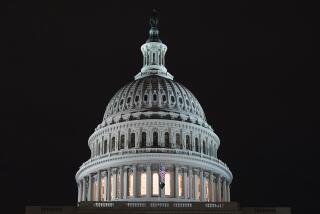U.N. Approves 6-Month Cap on Budget for 2006
- Share via
NEW YORK — Under intense pressure from the United States, U.N. members agreed Friday that the world body would receive half of its budget for 2006 until it could show that its management had become more accountable and streamlined.
If U.N. members show progress on key reforms by June, the $950-million cap will be removed, and the U.N. will receive the rest of its nearly $2 billion in dues from member nations.
In an effort to keep momentum behind lofty pledges of reform made at a September summit, the United States had linked approval of the budget to change. The move was fiercely opposed by developing countries, leading to a marathon negotiation that threatened to scuttle the entire $3.8-billion 2006-08 budget.
Among management reforms that the 191-member General Assembly must approve are new international accounting standards, buyout plans for employees, a review of programs older than 5 years and a strengthened internal watchdog office.
U.S. Ambassador John R. Bolton called the deal a victory for the United States. He has made management reform one of Washington’s top priorities. The U.S. provides about 22% of the U.N.’s budget.
“The United States obtained something it had been striving for the last three months, clear linkage between management reform and the budget process at the United Nations,” Bolton said after announcing the agreement. “I am confident we have a lot of hard work ahead.”
The U.S. and Britain, traditional allies, disagreed about how best to keep up pressure for reform. British Ambassador Emyr Jones Parry feared that the U.S. proposal of a three-month budget would strangle U.N. cash flow and intensify divisions among members. He cast Friday’s agreement as a victory for European diplomacy.
He said the European Union had been responsible for building bridges with a group representing 133 developing countries. Britain currently holds the presidency of the European Union.
“Both parties came to where the EU wanted to be,” Jones Parry said.
Ambassadors from developing nations said they felt forced into the agreement by the largest contributors and said they did not want to see such budget pressure become a new tool in the wealthy members’ arsenal.
Jamaican Ambassador Stafford O. Neil, head of the group of developing countries, insisted that this was “an exceptional measure not to be repeated or used for the future.”
The group’s resistance should not be regarded as opposition to reform, but to the way it was being forced into an artificial timetable, he said.
“We find unpalatable the fact that there is this ax hanging over our head,” he said.
More to Read
Sign up for Essential California
The most important California stories and recommendations in your inbox every morning.
You may occasionally receive promotional content from the Los Angeles Times.










